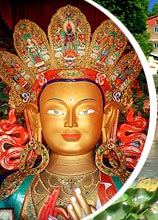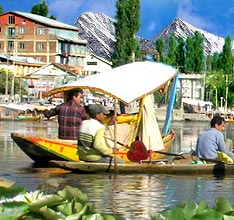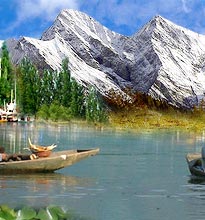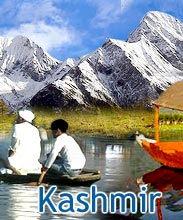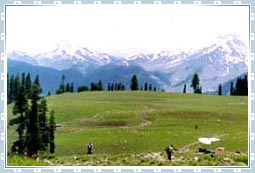 The history of Kashmir valley is associated with many legends. It is believed that where the Kashmir valley now stands, was once a huge lake. The lake served as home to a very detestable demon. Kashyap, Lord Brahma's grandson drained away most of the lake with the help of Goddess Parvati. The demon was crushed to death when Goddess Parvati dropped a mountain on him. A witness to the rich history of Kashmir valley, the mountain still stands in the district of Srinagar and is known as "Takht-e-Suleiman". The mountain provides a beautiful backdrop to the already picturesque city of Srinagar. Before you set yourself on the trip of Kashmir you must have some idea on the history and origin of Kashmir.
The history of Kashmir valley is associated with many legends. It is believed that where the Kashmir valley now stands, was once a huge lake. The lake served as home to a very detestable demon. Kashyap, Lord Brahma's grandson drained away most of the lake with the help of Goddess Parvati. The demon was crushed to death when Goddess Parvati dropped a mountain on him. A witness to the rich history of Kashmir valley, the mountain still stands in the district of Srinagar and is known as "Takht-e-Suleiman". The mountain provides a beautiful backdrop to the already picturesque city of Srinagar. Before you set yourself on the trip of Kashmir you must have some idea on the history and origin of Kashmir.With the passage of time, the dried area of the lake came to be inhabited by the Brahmins. This settlement got the name of Kashmir. For many centuries, the Hindu community continued to be dominant in the valley. One of the religions to be introduced in this area was Buddhism. Initiated by the missionaries of Emperor Ashoka, the religion got a further boost in the 2nd Century under the rule of the Kushanas. The history of Kashmir saw many dynasties being founded and replaced by new ones. Shams-ud-Din founded the first Muslim dynasty in Kashmir after replacing Hindu king Udiana Deva in 1346. Once again, Kashmir was conquered by the Mughal emperor Akbar in 1586 and became a part of the Mughal Empire.
Thereafter, the state was again conquered in 1757 by Ahmed Shah Durrani and then in 1819 by the Sikh ruler, Maharaja Ranjit Singh. In 1846, the British overpowered the Sikhs and sold this beautiful valley under the Treaty of Amritsar to Ghulab Singh of Jammu for Rs 7.5 million. Ghulab Singh gained the status of an independent princely ruler of Kashmir from the British and went on to annex Ladakh and added it to his empire. After his death in 1857, his descendants such as Maharaja Rambir Singh, Maharaja Partab Singh and Maharaja Hari Singh ruled Kashmir.
It was during the rule of Maharaja Hari Singh in 1947, that the partition of India and Pakistan took place. At the time of partition, the decision to join either India or Pakistan was left in the hands of the rulers of princely states. Maharaja Hari Singh chose to join India instead of Pakistan. However, since the majority of the population of Kashmir was Muslim, there has been a constant tussle between India and Pakistan over the valley. Pakistan has, since the partition, staked a claim on Kashmir on the basis of the dominant Muslim population. But, India refuses to concede it to Pakistan.

